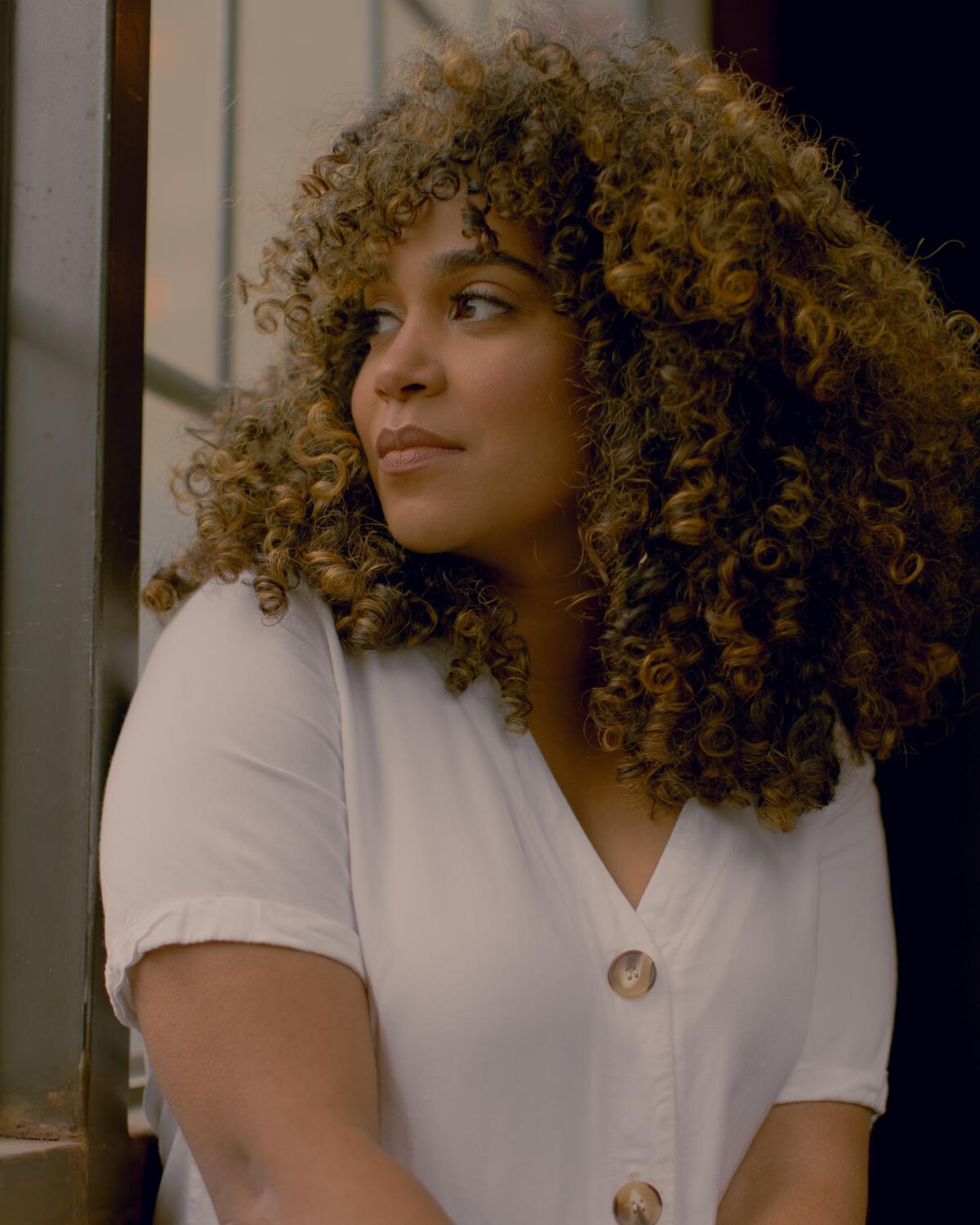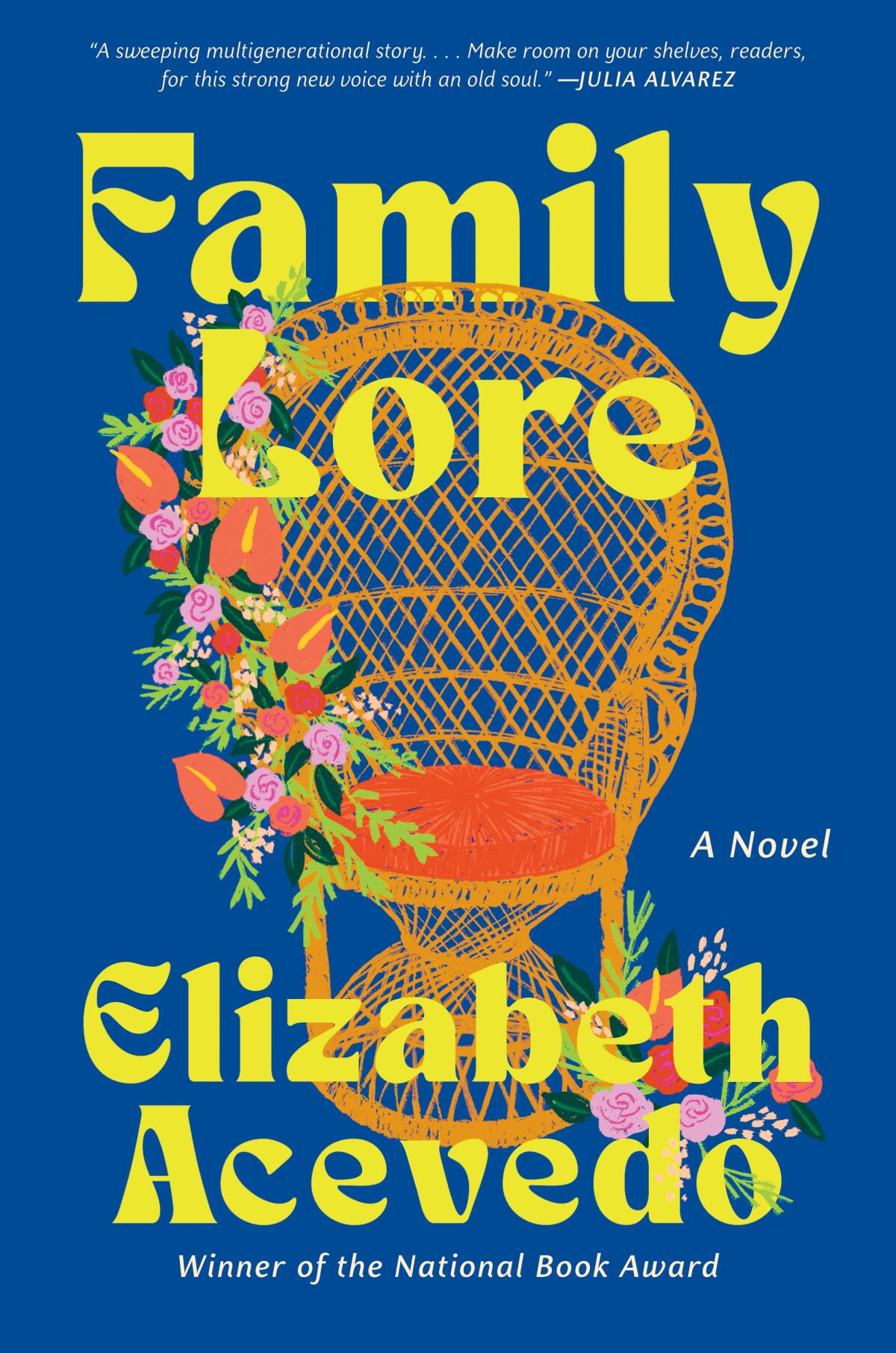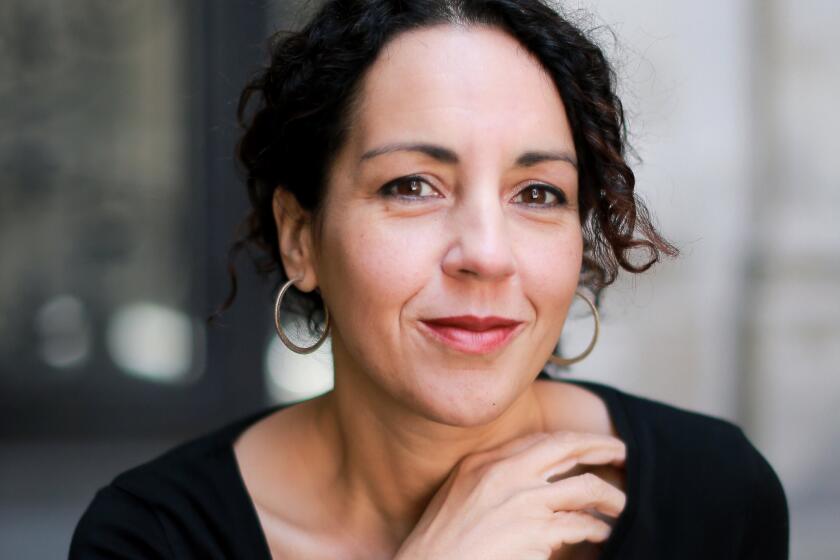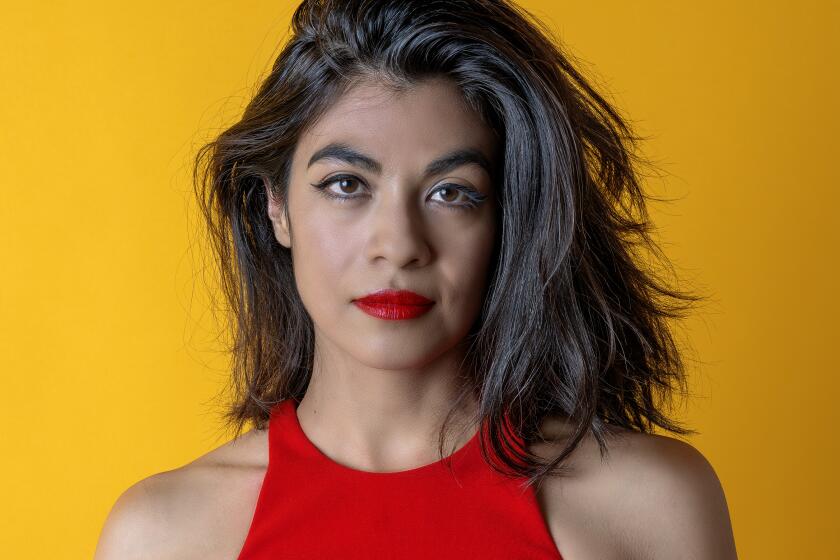An ‘alpha vagina’ gets top billing in YA star Elizabeth Acevedo’s first (very) adult novel

- Share via
On the Shelf
Family Lore
By Elizabeth Acevedo
Ecco: 384 pages, $30
If you buy books linked on our site, The Times may earn a commission from Bookshop.org, whose fees support independent bookstores.
If you’re a fan of bestselling YA novelist Elizabeth Acevedo — and there are many; her book “The Poet X” won a National Book Award in 2018 — you might be in for a surprise. “Family Lore,” her first novel for adults, has plenty of magic, but it also has plenty of very adult pleasure. Its fusion of Latin American tradition and streetwise steaminess — she says she wanted to take magical realism and “make it hip-hop” — can be traced to Acevedo’s background as a Dominican American poet raised in Harlem.
“Family Lore” follows the Marte family as they prepare for a wake arranged by Flor, who can predict when someone dies; but can she predict her own death? Most of Flor’s sisters and their children have special powers, but they all have secrets. Together, they are a team of horny mothers, truth-seekers and one possessor of an “alpha vagina.” (More on that soon.)
Acevedo uses an innovative storytelling structure to mirror oral traditions. It makes for a wild narrative, but the real journey is interior — a quest to reclaim the body and the pleasure that comes with it, and to answer the question: Just how far will you go to be known, and once you arrive, what will you say?
“How Not to Drown in a Glass of Water,” by “Dominicana” author Angie Cruz, is a funny, sharp character study set in Manhattan’s Washington Heights.
Acevedo spoke to The Times from her home in Washington, D.C., over Zoom about writing for adults, fictional sexuality and the medical emergency that inspired the book. The conversation has been edited for clarity and length.

This is your first adult novel. How did that affect your approach to the writing and subject matter?
I was really interested in taking risks. That doesn’t mean I’m not taking risks with YA, but young people might not have been exposed to as many different forms of literature, and so I’m making sure they can stay in the story. I think I’m less interested in playing it safe with adult readers.
And this is the way oral storytelling works; it is kind of hodgepodge and mosaic, interrupted by asides. I knew that that might be off-putting to some readers. And so, for YA, I might have erred a little bit more on the side of like, let’s not make anyone feel like this isn’t super warm and welcoming for them, and for this book it’s kind of like, yeah, f— it. If you’re the kind of reader that needs a really linear, really Western kind of story, this might not be for you. There are some of us who come from traditions that aren’t so clean-cut, and you’re welcome.
Tell me about those interviews and parenthetical asides. Why were they always from the point of view of one character, Ona?
Originally they were abstracts in lieu of the interviews that represented Ona’s work. But what ended up happening is that I didn’t want an interruption, but [something] more like: Here’s the way that you are constantly reminded that there is a person crafting the story that you are being told.
Bay Area novelist Ingrid Rojas Contreras tells of how a head injury led her to revisit the shamans in her life — and her native Colombia.
Each family member has a unique relationship to their body, including intuition that can be difficult to find language for. How did you decide to evoke the supernatural in your characters?
Originally I wanted Flor to have the ability to see when death will happen. And then one day I was on the phone with my best friend and she’s like, “Everybody in my job got their period because I have my period and I have an alpha vagina.” That’s not how menstruation works, but I love that term. There was just so much that felt so subversive and rich there. And so I had those two characters and I knew from there, everybody’s gonna have a thing, and then there’s going to be the one character that doesn’t have this innate thing.
But what does it mean when you have to craft your own magic, when you have to cobble it together? The magic became a big part of how I understood the characters, but also how I understood the world. It’s not magic that is safe in anyone. It’s not magic that they’re making money off of. It’s just as critical a talent as walking or breathing. There are so many Latin American writers that have written magical realism, and I wanted to make [it] hip-hop, I wanted to make it a thing that we haven’t seen.
Many of the sisters come into their own relationships with pleasure. What inspired your candid approach to sex and sexuality?
I’m so happy to hear you say that because it’s the one thing that keeps me up at night. It’s like, my mom is going to read this book and know I watch porn, right? But it’s coming from a really Catholic, really Dominican background, where purity culture is upheld to the utmost, but then also a culture that loves sensual music and loves form — like the way we dress, the way we move, the language is all very sensual. There’s such contradiction there that has never made sense to me.
It could’ve been a book that had no sex, right? But I read all these books by white women who are having sex and orgasms and it’s fantastic. And I’m like, why? You have to see it on the page. It feels honest to just be like, yeah, they have sex, and it is and isn’t everything we expect from the “spicy Latina” stereotype.
A Times analysis has found that Latino representation in film and TV has stagnated for a decade-plus, even as Latinos’ share of the population has grown.
Strained mother-daughter relationships and a deep, unspoken desire for connection are huge themes here. Where did Ona’s ambivalence about fertility and motherhood come from?
I started this story [in 2020] in the middle of isolation, in the midst of realizing that I was going to have to have abdominal surgery to remove a fibroid that, you know, changed the chances of fertility. A lot of Ona’s relationship to her body reflected my relationship to my body. Ona’s understanding of the body is cut open and light enters. And what that did to the character, I had not thought of it that way. It was like I was cut open and cold came in and then like my whole surgery was f—. Ona has a different understanding.
Can you tell me a bit about your approach to writing queer characters?
All of my books have queer representation, and that just feels important to me. Ona’s queerness is very clear on the page and spoken, but not a coming-out story. There is not a huge explanation. Not a “does my mother love me?” It just is as it is. I think the largest nod is her mom being like, “I always thought you were going to marry that girl,” right? And that is enough to recognize that her parent knew and she is OK, and everything is still intact. I think that there are a lot of parents who maybe are more open than we give them credit for within the Latine community. And there’s a way to write those parents too.
When dealing with subjects like queerness and sexuality, how does shame manifest, either in the text or as you were writing?
Shame for me often manifests as fear and anxiety, and a hiding and not wanting anyone to know, not wanting anyone to see. Ona specifically writes about the moment where she is watching [porn] and it’s a private moment, and it is where her desires are driven to, and the moment after coming she has to grapple with: What does it mean that I find pleasure in what I find pleasure in? Shame is interesting in that it is often rooted in what we have been told needs to be secret, and even if it is hurting no one we still confront it as this painful wound you can’t look at.
I think for me, the best way to process shame is to look at it, let the light in. We can’t even recognize what’s at play until we just put eyes on it. And I think in writing all of this, it was just letting it out. Like, yeah, my mom is going to read this. She’s going to have concerns. And it’s also like, yeah, mom, and that is what I write. I hope it is OK with you to know me fully. That is the peace I have to make at the end of the day, that at least I was known.
More to Read
Sign up for our Book Club newsletter
Get the latest news, events and more from the Los Angeles Times Book Club, and help us get L.A. reading and talking.
You may occasionally receive promotional content from the Los Angeles Times.










